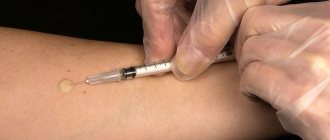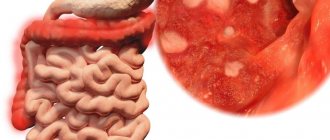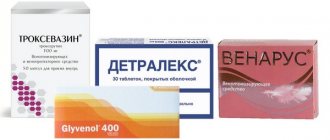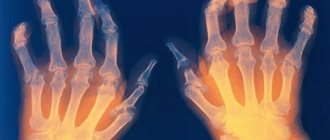What happens if you don't get treatment?
The main directions of treatment for antrum gastritis are drug therapy and diet; the use of folk remedies is allowed as an adjuvant.
Drug therapy for gastritis
Treatment of antral gastritis with medications involves the prescription of several groups of drugs, depending on the specified diagnosis:
- antibiotics;
- enzyme agents;
- painkillers;
- anti-inflammatory drugs;
- agents that normalize secretion.
Antibacterial therapy is prescribed if H. pylori is detected, but due to the high resistance of the bacteria to antibiotics, two or three different bacterial drugs are prescribed - this increases the effectiveness of eradication of pathogenic microorganisms.
Proton pump inhibitors are drugs prescribed for increased gastric acidity. They suppress (inhibit) the secretion of hydrochloric acid, reducing its concentration in gastric juice. Treatment of acid-dependent gastric pathologies is usually supplemented by the attending physician by prescribing antacids, which are considered drugs of the second group and complement the action of proton pump inhibitors.
Enzyme agents are used for low acidity of fatty acids. They have a positive effect on the ability of the gastric glands to produce hydrochloric acid.
Since any type of gastritis is characterized by the presence of inflammatory processes of varying severity, in most cases, treatment of antral gastritis involves the use of anti-inflammatory drugs.
To eliminate pain and discomfort in the epigastric area, painkillers (antispasmodics) are used.
Quite often, the antrum becomes inflamed due to duodenogastric reflux, which is treated with dopamine receptor blockers.
Fast food is contraindicated for gastritis
Drug therapy for gastritis of any type must be combined with a diet.
If antral gastritis is diagnosed in the acute stage, you will have to fast for two days, limiting yourself only to taking large amounts of liquid. Subsequently, until the patient feels relief, diet No. 1 is prescribed, which is replaced by a more gentle diet No. 5.
Since inflammation of the lower stomach in most cases is accompanied by increased acidity, foods and dishes that stimulate the secretion of hydrochloric acid or contain a high concentration of acids (in particular, citrus fruits) should be excluded from the diet menu for antral gastritis of the stomach.
You should also not eat fatty, fried, smoked, spicy foods, canned food or preserves, including homemade ones. Any fruits and vegetables rich in indigestible fiber are also taboo, as are fresh baked goods and rye bread.
You should not drink strong tea/coffee, carbonated or alcohol-containing drinks, and you should stop smoking at least for the period of treatment. You should eat with short breaks of two to three hours, that is, at least 5 to 6 times a day. Preference should be given to easily digestible dishes - soups and cereals prepared in water or milk from cereals such as rice, buckwheat, oatmeal.
Focal antral gastritis tends to progress. If treatment is not started in time, it can develop from superficial focal (virtually asymptomatic) into atrophic focal (leading to severe complications).
Treatment of erosive gastritis
The following directions in its treatment should help get rid of erosive gastritis:
- Elimination of excess secretion of gastric juice. Achieved by using drugs with an antisecretory mechanism of action. These can be either histamine receptor blockers or proton pump blockers. Of the first group, famotidine, ranitidine, and quamatel are the most widely used. From the second - omez, lansoprazole, controloc, proxium;
- Neutralization of aggressive hydrochloric acid. For these purposes, antacids are indicated: Rennie, Maalox, Almagel, Phosphalugel, Venter. They not only eliminate excess acidity, but also form a protective film over inflammatory mucosa and erosions. This promotes their rapid healing;
- Facilitation of digestive processes in conditions of blocked gastric secretion. Different generations of enzyme preparations are used: Creon, Mezim, Festal, Panzinorm, Pangrol;
- Restoration of normal motility of the stomach and duodenum. In most cases of erosive-hemorrhagic gastritis, its violation occurs. This pathogenetic component can be eliminated with the help of metoclopramide, cerucal, motilium, domperidone;
- Hemostatic drugs. Used only in cases of erosive-hemorrhagic gastritis. It is better to administer intramuscularly or intravenously: etamsylate, dicinone, vikasol, thioctic acid;
- If the Helicobacter pylori nature of erosive gastritis is confirmed, the use of anti-Helicobacter drugs is indicated: clarithromycin, metronidazole, ornidazole, amoxicillin, de-nol or ready-made combination drugs (pilobact neo, clatinol);
- Treatment with alkaline mineral waters. It is better to carry it out in specialized sanatoriums.
On topic: prevention of gastritis
What is antral gastritis?
This is one of several types of chronic gastritis, the first stage of which is erosive gastritis. Do you know what this is?
I think not, because I didn’t know until I began to diligently delve into the search for deciphering these terrible and incomprehensible words.
In general, this is a disease that affects the gastric mucosa in the antrum, which gives the disease its name. The antrum is located at the exit from the stomach to the intestinal tract.
It is responsible for reducing the acidity of food and producing secretory mucus, which protects the walls of the stomach from its own acid.
If mucus is not produced, damage to the stomach occurs, and if the problem is ignored or treatment is delayed, gastroduodenitis may develop (simply inflammation of the duodenum and our already sluggish stomach), by the will of which ulcers form in the stomach, after which gastritis becomes chronic!
According to the nature of the flow, they are distinguished:
- Acute or active antral gastritis;
- Chronic gastritis of the antrum of the stomach.
It is surprising that children are more likely to get a sore than adults, since about 95% of cases of chronic antral gastritis are directly related to the discovery in the gastric mucosa of a bacterium called Helicobacter pylori, which is transmitted technically, and with children's restlessness this is not surprising!
This nasty bacteria can comfortably live in a person’s stomach if he has high acidity!
In the case of low acidity, the bacterium can take a special form of dormancy and wait until it enters a comfortable environment to resume its activity.
A special feature of the Helicobacter bacteria is that they produce a number of enzymes that help change the environment around them.
What is erosive gastritis and how dangerous is it?
Erosive gastritis is an inflammation of the gastric mucosa, a specific feature of which is the formation of defects on its surface.
If erosions are not treated in time, they can subsequently transform into ulcers and stomach cancer.
Erosive gastritis is characterized by the appearance of defects in the gastric mucosa
Types of erosive gastritis
There is no single classification, but it is generally accepted to divide gastritis into acute and chronic. The latter is rarely accompanied by the appearance of erosions.
There are two phases of chronic erosive gastritis:
- exacerbations,
- remission (subsidence): complete (characterized by the disappearance of symptoms and healing of erosions),
- incomplete (weakening of clinical manifestations and/or insufficient closure of defects).
Depending on the presence of bleeding, erosions are distinguished:
- bleeding,
- non-bleeding (hemorrhagic gastritis).
According to the endoscopic picture, defects are distinguished:
- single,
- multiple.
Depending on whether gastritis is caused by Helicobacter pylori infection or not, it is classified into:
- associated with Helicobacter pylori,
- not associated with Helicobacter pylori.
Why does inflammation develop in the stomach?
Helicobacter is considered the main cause of antral gastritis. Nine varieties of this microorganism have been identified. It differs from others in the ability to live in an acidic environment and the ability to actively move in the gel-like stomach mucus.
Helicobacter provides its own protection by producing enzymes:
- urease,
- alkaline phosphatase,
- glucophosphatases,
- proteases,
- mucinases,
- phospholipases,
- superoxide dismutase.
In addition, it synthesizes a protein that suppresses the production of hydrochloric acid by the stomach glands. For some time, a person becomes an asymptomatic carrier of the pathogen, a reservoir of infection. Infection is transmitted through water, dirty hands, insufficiently treated endoscopic instruments, and saliva from kissing.
In the presence of risk factors, Helicobacter is activated and causes chronic damage - gastritis of the antrum of the stomach. Penetrating into the wall of the epithelium, Helicobacter is fixed in it and becomes inaccessible to the mechanical and chemical factors of gastric juice
Kinds
Erosive gastritis has several varieties, each of which has distinctive features, namely:
- The antaral type of erosive gastritis is considered the most common, characterized by damage to the fundus of the stomach.
- Hemorrhagic erosive gastritis - with repeated gastric bleeding, requires constant medical supervision and dietary restrictions.
- Acute form of erosive gastritis - accompanied by severe painful symptoms, nausea and vomiting.
- Erosive reflux – gastritis, with the formation of large ulcers on the surface of the stomach.
- An erosive-ulcerative type of gastritis, which is a precursor to a stomach ulcer.
- An erosive type of gastritis with low acidity, manifested by severe pain.
Each type of gastritis requires careful attention; when diagnosing each of them, it is necessary to take all possible measures to prevent further progression of the disease. It is important to remember that gastritis cannot go away on its own; appropriate therapy is required to eliminate its symptoms.
Signs and diagnosis
The disease can masquerade as a food infection. But in this case, the symptoms are associated with gastric erosion; drugs for the treatment of erosive gastritis of the stomach can relieve the inflammatory process and prevent ulcers.
Characteristic signs of the disease:
- nausea;
- heartburn;
- bowel disorders;
- bloating;
- mild pain in the stomach.
In some situations, vomiting with blood streaks and the development of bleeding followed by a state of shock are possible. Complications include the appearance of ulcers.
At an appointment with a gastroenterologist, the patient undergoes a medical examination. The following are prescribed as diagnostics:
- blood tests;
- pH-metry to detect acidity;
- gastroscopy;
- biopsy.
Using probing, gastric secretions are examined. For this purpose, additional instruments are built into the gastroscope that determine the level of gastrin.
Diet
Diet therapy is one of the important components of the treatment of focal antral gastritis. Usually table No. 1 is assigned. What are the basic principles of nutrition?
- Frequent and small meals: 4-6 times a day in small portions. You shouldn't overeat before bed.
- From the diet you need to exclude smoked meats, spices, fatty and fried foods, coffee, alcohol and carbonated drinks, sour fruits and berries.
- It is better to replace butter baked goods with dry types of cookies, and also limit dishes containing large amounts of sugar.
- Food should be warm, well boiled or chopped.
Expert opinion
Irina Vasilievna
Practicing gastroenterologist
The diet is selected individually depending on the dysfunction of secretory function, the form and severity of the disease.
Treatment of erosive antral gastritis involves strict adherence to the principles of a balanced diet, complete avoidance of foods that irritate the gastric mucosa and the use of correct cooking methods. The most suitable would be boiling or cooking food using steam, and it is better to eat crushed food that does not contain solid particles that injure the lining of the stomach.
Food portions should be small, and it is better to eat at least 5-6 times a day, avoiding long breaks between meals. All spicy, fried, salty foods, smoked foods, marinades, carbonated drinks and any types of alcohol are categorically unacceptable not only during exacerbations, but also during periods of remission.
If you have erosive antral gastritis, you can use the following:
- Dishes at a comfortable temperature for the stomach, that is, not hot and not too cold;
- Chopped food;
- Broths from lean meats and poultry;
- Steamed fish dishes;
- Baked apples and fruit purees;
- A small amount of flour products;
- Soggy porridge.
It is necessary to adhere to the recommended diet for a long time, even after recovery. You need to be careful with fermented milk products, sour cream and yoghurts should have minimal fat content, and whole milk will need to be abandoned, as it promotes fermentation in the stomach and increases gas formation. It is not recommended to consume fruits and berries that have a sour taste, as well as juices from them.
Basic nutrition rules:
- food should be consumed in liquid or porridge form;
- it is necessary to eat fractionally, in small portions 5-6 times a day (at intervals of no more than 4 hours), without loading the digestive system in the evening;
- It is worth excluding from the diet: foods rich in coarse fiber (fresh vegetables) and provoking gas formation and fermentation (yeast baked goods, cabbage, legumes, grapes, sour cream), overly spicy, spicy and fatty dishes, marinades and pickles, semi-finished products, sweets (especially chocolate); use dried fruits with caution;
- It is better to cook in a double boiler, bake in the oven or boil in water. You will have to give up fried foods;
- The basis of the diet for antrum gastritis is: mucous soups and porridges (rice, semolina, pearl barley), soft-boiled eggs or steam omelet, stewed or boiled vegetables; puree or jelly from lean meat and fish, low-fat cottage cheese, skim milk; vegetable and fruit purees, jelly; Wheat bread crackers are allowed;
- It is important to give up bad habits - alcohol, cigarettes, coffee and strong tea, soda, quick snacks.
In some cases, therapeutic fasting is indicated. Complete abstinence from food allows the mucous membrane of the digestive organs to rest and recover on their own.
What you can and cannot eat
A very important point in the treatment of many diseases is a properly selected menu. This is especially true for erosive gastritis of the stomach.
During the period of exacerbation
Diet for erosive gastritis is used as treatment and prevention of exacerbations.
In the acute stage of erosive gastritis, table No. 1 is recommended for the patient. Nutrition in this case is aimed at maintaining maximum sparing of the stomach from mechanical, thermal and chemical irritants. The menu for exacerbation of erosive gastritis should be complete in terms of the amount of proteins, fats, carbohydrates and calories. Dishes that linger in the stomach, irritate its lining or stimulate secretion are subject to restriction. All dishes must be served pureed, boiled, or steamed. Too hot or cold foods are not recommended for erosive gastritis.
In the first days of an exacerbation, you can eat soups made from semolina or rice, jelly. It is useful to eat soft-boiled eggs in the morning.
When some relief occurs, the patient can diversify the menu:
- vegetable, dairy, mucous soups;
- dry cookies, yesterday's white bread;
- dairy products, including fresh kefir or yogurt, cottage cheese and cheese;
- low-fat fish;
- dietary boiled meat;
- soft-boiled eggs or in a bag;
- boiled fruits;
- vegetables (mashed potatoes, cauliflower, carrots, beets);
- any porridge, except barley and corn;
- Drinks you can use are not too sour compote, jelly, weak tea, sometimes cocoa;
- as a dessert - honey, jam, marshmallows;
- Instead of seasonings, you can eat parsley or dill.
After achieving remission
After reducing acute inflammation in erosive gastritis, the patient is recommended to switch to table No. 5. The following are prohibited:
- any fast food food;
- cooking oil and fatty animal products (sausage, pork, blood);
- confectionery and butter products;
- smoked meats, pickles;
- legumes;
- sweet and unsweetened carbonated drinks;
- chewing gum;
- pearl barley porridge;
- any products with oxalic acid (radish, radish).
During remission of erosive gastritis, the menu should include vegetables and fruits, there should be a sufficient amount of them. It should be prepared by steaming, boiling or stewing. Sometimes you can afford a baked dish, but you must first remove the crust.
When choosing meat for the menu for erosive gastritis, you should use rabbit or chicken. All fat should be completely trimmed off before cooking.
You can eat white bread, but it should be stale and without a crust. Sometimes you should treat yourself - eat biscuits or biscuits.
To replenish protein in the body, it is recommended to consume:
- low-fat cottage cheese, cheese, cream, sour cream;
- sweet apples, other ripe fruits;
- soups with pasta or vegetables, sometimes with oatmeal or rice;
- for dessert - marshmallow, pudding, marmalade.
How to diet and still have fun
Despite the fact that many dishes are not recommended for stomach diseases, nutrition for erosive gastritis can and should be varied. Here is an example of a menu for one day:
- For breakfast, boil yourself one soft-boiled egg, add porridge (rice) and wash it down with weak tea with two biscuits and a spoonful of jam.
- For the second morning meal, you can use one banana or baked apple. It should be noted that bananas are very useful and can complement treatment for stomach problems. They have an enveloping effect and supply the body with vitamins and microelements.
- At lunch, traditional soup (with the addition of oatmeal) and a couple of meatballs are placed on the table. Vegetable puree is suitable for the second.
- In the evening, it is recommended to eat boiled fish in a mild milk sauce. Drink tea with milk.
- A few hours before bedtime, you can drink a glass of kefir with biscuits or marmalade.
For any disease, including erosive gastritis, you should strictly adhere to the doctor’s recommendations, take medications on time, follow a daily routine and diet. To make the table tasty and varied, you need to make a list of allowed products and, based on it, your menu for the week.
Treatment of bacterial or antral gastritis with traditional medicine
In my opinion, there is nothing better than traditional medicine, which is why I will give you a couple of tips that are in demand among almost all my acquaintances and friends!
The recipe is very simple, you need a balanced diet, folk remedies and willpower.
A diet for inflammation of the mucous membrane excludes the following foods from the diet:
- Rye bread and puff pastries;
- First courses based on fish and meat broths, okroshka and mushroom soups;
- Fatty meat and poultry, canned food, smoked products;
- Sweets, spicy and salty dishes;
- Carbonated drinks, kvass and coffee.
This diet will need to be followed for about 14-28 days, after which you will need to drink Monastic tea to prevent parasites. Do not return to the stomach every 3-4 months.
Propolis elixir Zdorov for gastritis is aimed at long-term remission. After just 1 course, gastritis gradually disappears, and the functioning of all body systems is restored.
And finally, I wish you success in the fight for your health and the health of your family!
Folk remedies
Any folk remedies for the treatment of erosive antral gastritis should be used as an auxiliary therapy and only after approval by the attending physician. Recipes use honey, wheat and oat sprouts, aloe leaf juice, and various bee products. Folk remedies help to quickly restore the changes that have occurred, eliminate painful symptoms, and also help prevent dangerous exacerbations.
All drugs that are used for treatment at home can easily be prepared independently based on natural ingredients. One of the most effective methods of treating gastritis, proven in practice for more than one generation, is sea buckthorn oil. When using it, you must follow some conditions, namely:
- Maintain regular intake;
- The first dose should be taken early in the morning, on an empty stomach, 30 minutes before meals;
- Store the oil away from direct sunlight, best in the refrigerator, at a temperature no higher than five degrees;
- For prevention - patients after reaching the age of 14 years, take one teaspoon, two weeks of administration alternated with two weeks of break;
- For the treatment of existing pathology - the same amount, but when treating for three weeks, the break does not exceed one week.
When using traditional methods in the treatment of gastritis, it is necessary to remember that it is unacceptable to refuse prescribed drug therapy, since they serve as an addition to the main course of treatment. It is unacceptable to independently prescribe and apply any folk methods to yourself.
The following are used as therapeutic agents that have shown their effectiveness in the treatment of erosive antral gastritis:
- Juice from white cabbage promotes faster recovery of damage to the gastric mucosa.
- Juice obtained from raw potatoes copes well with any exacerbations of erosive gastritis. Half a glass of freshly prepared juice, drunk on an empty stomach, will be enough.
- Juice from celery and carrots helps eliminate irritation. Take half a glass before lunch and dinner.
- Propolis tincture in the amount of 20 drops per glass of water. Helps cope with painful symptoms, and relief occurs after the first dose.
- Chamomile decoction in milk, dry raw materials in the amount of five tablespoons are brewed in a glass of milk, infused and drunk before meals. This remedy relieves stomach pain and speeds up healing.
- A decoction of plantain leaves is used for both peptic ulcers and erosive gastritis.
- Flax seed. A decoction is prepared from it, for which two full spoons of the seed are brewed in 0.5 liters of boiling water, kept in a water bath for 10 minutes, then left to cool. The squeezed mucus is taken one tablespoon after meals.
Oatmeal, decoctions and infusions from birch leaves, St. John's wort, galangal, cinquefoil, yarrow, oregano, linden and many others are used as effective remedies in the treatment of erosive gastritis. Choosing any of them must be done with some caution, since some may cause individual intolerance in the form of allergies.
Erosive - what is it?
Erosion occurs as a response to constant inflammation of the gastric mucosa in a chronic form, or as a response to severe stress. The gastric mucosa is damaged in the form of erosions - cracks, ulcerations. The disease can be acute and develop rapidly in a dangerous form. Or it proceeds hidden and leads to multiple erosive damage. It also happens that erosion of the mucous membrane is also found in the duodenum. If measures are not taken, incl. and special medications, damage to the mucous membrane can take on an ulcerative form.
The drug treatment and additional traditional medicine used, as a rule, provide a good chance of a favorable outcome.
The treatment regimen for erosive gastritis is similar to that used for stomach ulcers. Both diseases have approximately the same symptoms and a fine line between one condition and the other. First of all, treatment will be aimed at eliminating the very cause of the disease. For example, if it turns out that bacteria are to blame, antibacterial drugs will be used. Then the acidity of the stomach is adjusted, finding out whether it is low or high. And, of course, treatment is provided aimed at relieving symptoms: pain, dyspeptic symptoms (nausea, vomiting, etc.). Drug treatment is usually combined with traditional methods and strict nutritional rules.
Complications
The negative consequences caused by antral gastritis in erosive form can be expressed in the following conditions:
- Development of gastric bleeding of varying intensity;
- Transition of the disease into an intractable chronic form;
- Spread of pathology to nearby organs;
- Peptic ulcer;
- Formation of polyps in the stomach;
- Malignant neoplasms.
Any of these conditions can develop as a result of lack of treatment or ignoring the recommendations of the attending physician. In order to prevent these serious complications, it is important to be attentive to your health and at the first symptoms of trouble in the body, seek help from doctors.
Features of the disease
Erosive gastritis of the stomach, unfortunately, is quite common among gastrointestinal diseases. The reason for this is stress, disturbed ecology, and eating on the run. irregularity of food intake. And when problems with digestion arise, people, as a rule, try to cure themselves. They take medications that they have prescribed for themselves, obtaining temporary relief or, possibly, worsening. This transforms the disease into a chronic form or, even worse, accelerates the onset of complications. If symptoms such as:
- burning sensation in the pit of the stomach;
- heartburn, nausea, vomiting;
- discomfort and bloating;
- increased previously tolerable pain that appears after eating;
- the appearance of a white coating on the tongue and pain in the stomach area upon examination;
- the presence of blood in the vomit and the black color of the stool indicate the presence of bleeding erosions.
There is no way to put off a visit to a gastroenterologist.
Drugs
For the erosive form of antral gastritis, antibiotics directed against Helicobacter pylori infection are often used, as well as drugs for the rehabilitation of the mucous membrane in the form of gastric juice acidity regulators. Therapy involves long-term implementation according to an individual treatment regimen. Patients are prescribed medications such as Rennie and Maalox, which alleviate the condition of patients and relieve pain and other manifestations of discomfort.
On the recommendation of the attending physician, patients are prescribed a drug such as Afobazole, as well as other drugs, the prescription of which depends on the individual condition of the stomach and the degree of changes in it caused by the disease.
Diagnostics
The examination of the patient begins with a history and physical examination. To accurately determine the presence of erosive lesions of the gastric mucosa, laboratory and instrumental studies are required.
Laboratory methods:
- General blood test, general urine test, coprogram.
- Fecal occult blood test.
- Bacteriological analysis of stomach contents and feces.
- Immunological blood test.
- Histological and cytological examination of a biopsy taken at fibrogastroduodenoscopy (FGDS).
- Tests for the determination of H. Pylori.
Instrumental methods:
- FGDS is the most modern method for studying the internal organs of the gastrointestinal tract. The procedure allows you to obtain detailed information about the condition of the gastric mucosa, take photographs of the areas being examined, perform a biopsy and take material for a test to determine the bacterium H. Pylori.
- X-ray with a contrast agent makes it possible to identify motor-evacuation disorders and exclude the presence of more serious diseases.
- Thermography is a modern and highly informative method for diagnosing the condition of the gastrointestinal tract. Detects disturbances in the functioning of internal organs using infrared radiation.
The symptoms of erosive gastritis are similar to those of peptic ulcer disease. When making a diagnosis, they primarily rely on the results of FGDS. The condition of the lesions determines whether a diagnosis of erosive gastritis can be made. During an endoscopic examination, doctors determine the presence of redness, swelling and bleeding of the mucous membrane. In this case, the acidity of the stomach may be normal or slightly reduced.
You can distinguish erosive gastritis from other forms of gastritis by dark, granular vomit and black stools - all this indicates gastric bleeding. Prolonged blood loss leads to anemia.
Principles of treatment
In modern gastroenterology, treatment of gastric pathologies with folk remedies is considered as second-line treatment. Drug treatment in most cases is more targeted and therefore more effective, but its main drawback is the presence of a large number of side effects.
Basic traditional medicine recipes for the treatment of antral gastritis:
- aloe juice (3-4 year old plant);
- potato juice;
- infusion of yarrow;
- linden, chamomile tea, flaxseed drink;
- propolis tincture;
- St. John's wort decoction.
Propolis helps with gastritis
Erosive antrum gastritis requires complex treatment. Often, pathology is caused by not one, but several reasons, and in order to successfully cope with the disease, all provoking factors must be eliminated. Therapeutic measures include:
- taking medications;
- physiotherapy;
- diet;
- folk treatment during remission;
- surgical intervention (according to indications).
In the acute course of the disease, symptoms develop acutely. The patient's condition is rapidly deteriorating. If a large area of the gastric mucosa is affected by erosion, a complication is possible - internal bleeding. Therefore, if a diagnosis is made: acute erosive gastritis of the antrum of the stomach, inpatient treatment is mandatory. After acute symptoms are relieved, the patient carries out further treatment measures at home.
During the period of remission, as well as chronic erosive antral gastritis, treatment is carried out with folk remedies. This makes it possible to significantly reduce the risk of relapses and restore the gastric mucosa.
The traditional method of treatment is to use juices, infusions and herbal decoctions that promote the healing of mucosal defects. Here are some recipes from healers.
- In the morning, drink 100 ml of freshly prepared potato juice (15 days in a row).
- Cabbage juice is consumed half a glass three times a day before meals for a period of 1 month.
- Sea buckthorn oil is drunk 1 tbsp. l. three times a day before meals.
- Prepare sea buckthorn infusion. To do this, pour 200 g of berries with 1 liter of boiling water and leave for 2 hours. After cooling, add honey to the infusion. Drink a liter of drink during the day.
Treatment can only be prescribed to you by a doctor, after a personal examination and test results. Treatment takes place on an outpatient basis or in a hospital setting, depending on the form of the disease.
Complex treatment includes:
- honey. drugs,
- dietary nutrition;
- use of traditional methods of treatment.
- In the acute form, Motillac is prescribed in tablets, antacids (acidity-reducing drugs) Hefal, Almagel in the form of a suspension, enveloping agents - De-nol.
- If the disease is caused by a bacteria, the patient is prescribed 3-4 antibiotics at the same time. The combination may be: ampicillin, metronidazole. If the desired effect is not achieved in the next 5 days, the drugs are changed.
- For ulcerative atrophic gastritis, the drug Omeprozole is prescribed, which normalizes the formation of hydrochloric acid, as well as Pentoxyl and Methyluracid, which help restore cells in the stomach walls.
- If the cause of the disease is taking medications, then they are canceled and the entire course of treatment is reviewed.
- For antral reflux gastritis, drugs are prescribed that improve intestinal motility.
The second condition for recovery is proper nutrition. If an exacerbation occurs, it is recommended to eat porridge or liquid foods. It is consumed in small portions 5-6 times a day, with a break of up to 4 hours. Food that stimulates secretion is prohibited.
Any deviation from the prescribed diet, even if the patient has been diagnosed with moderately severe antral gastritis, can provoke a transition to the acute form.
For some types of disease, therapeutic fasting is practiced, which allows the walls of the stomach to recover.
Treatment of chronic gastritis in the antrum is not complete without mandatory adherence to a diet. Nutrition requires more frequent meals (6 times a day), in small portions without overloading the stomach.
Even with moderate symptoms, it is recommended to exclude fried and smoked foods, spicy seasonings, and sweets. All products must first be passed through a meat grinder. It should be cooked boiled or steamed.
During the acute phase of the disease, the following are prohibited:
- any canned food;
- fatty foods;
- fresh pastries, black bread;
- fast food;
- candies and chocolate;
- alcohol and carbonated water;
- coffee and cocoa;
- whole milk;
- rich soups;
- salty fish;
- grape.
Limited permission to accept:
- dried fruits compote;
- foods containing coarse fiber (vegetables, fresh fruits).
It is recommended to build a diet:
- from chicken broth with toasted white bread;
- boiled fish;
- porridge;
- vegetable puree or casserole;
- steam cutlets;
- cottage cheese casserole;
- pasta;
- non-acidic jelly.
If infection with Helicobacter is established, then treatment of antrum gastritis requires a course of eradication (this is the name for the process of destroying the pathogen). For this purpose, combinations of antibacterial drugs are prescribed:
- Clarithromycin,
- Ampicillin,
- Tetracycline,
- Metronidazole.
The patient must complete the eradication course and undergo a follow-up examination. In case of exacerbation of the disease, it is better to prescribe drugs by injection, so as not to further injure the gastric mucosa.
Drugs from the group of proton pump inhibitors are included
To relieve pain, well-known sympatholytics (No-Shpu, Papaverine) are recommended. To block the excessive secretory function of the stomach, enveloping drugs (Almagel, Denol, Hefal) are used. Cerucal helps eliminate reflux; it improves intestinal motility.
To activate the healing processes, the following are prescribed:
- Riboxin,
- Solcoseryl,
- Gastrofarm,
- anabolic steroids
Physiotherapeutic procedures are used only if signs of bleeding and transformation into a tumor are completely excluded. Usually prescribed:
- electrophoresis with drugs on the epigastric area;
- UHF;
- course of diadynamic currents;
- phonophoresis for pain relief.
For chronic antral gastritis, sanatorium-resort treatment using natural sources (Kislovodsk, Essentuki) or in local sanatoriums using mud and paraffin applications is recommended.
The use of folk remedies should be discussed with your doctor. A decoction is usually recommended:
- from flax seeds;
- chamomile;
- yarrow.
You should be careful with St. John's wort and potato juice. Nicotine and ethyl alcohol, in addition to their direct effect on the gastric mucosa, disrupt the processes of immune regulation and deprive the organ of the ability to defend itself
Chronic focal antral gastritis has its own classification. This is necessary to determine the type and extent of the disease, as well as to select an effective treatment regimen.
Types of focal antral gastritis:
- Superficial focal type (characterized by a slight change in the mucosa affecting the upper layer).
- Non-atrophic focal type (characterized by abnormal tissue proliferation).
- Atrophic focal type (areas of infected tissue that have grown deeper form necrotic foci, which leads to severe impairment of the basic functions of the antrum).
Expert opinion
Irina Vasilievna
Practicing gastroenterologist
The final treatment will depend on what form of gastritis is diagnosed in the patient’s medical record.
Complex therapeutic measures are aimed at normalizing the functioning of the stomach, relieving pain and other symptoms of the disease. The patient may be prescribed the following treatment:
- Diet therapy based on the principles of mechanical, thermal and chemical sparing of the gastric mucosa (refusal of spicy, rough, too hot or cold and poorly digestible foods).
- Maintaining a daily routine, which includes eating by the hour, alternating periods of physical activity and rest, and giving up bad habits.
- Drug treatment. The patient is prescribed antibiotics, histamine blockers, acidity regulators, and digestive enzymes.
- Physiotherapy. Appointed if necessary. May include electrophoresis, applications, electromagnetic waves or sinus currents.
- Sanatorium-resort treatment: therapeutic nutrition, balneotherapy, physiotherapy, climate therapy.
At the first stage of the fight against the disease, the patient is prescribed the following drug treatment regimen:
- Antibacterial therapy that suppresses the proliferation of pathogenic microflora, in particular Helicobacter pylori: Amoxicillin and its derivatives, Clarithromycin and its derivatives, Levofloxacin, Tetracycline, Metronidazole, Furazolidone.
- Gastroprotectors (drugs that protect the gastric mucosa): “De-Nol”, “Biscol”, “Ventrisol”.
- H2-histamine receptor blockers: Ranitidine, Gistak, Zoran.
- Proton pump inhibitors: Omeprazole, Losek, Omez, Helitsid.
- Antacids (medicines that neutralize hydrochloric acid): Almagel, Phosphalugel, Alugastrin.
- Antispasmodics, for example, “No-shpa”.
- Enzymatic agents that facilitate the absorption of food and reduce the load on the digestive organs. These include “Mezim”, “Festal”, etc.
- To eliminate nausea and vomiting, Domperidone and Metoclopramide are prescribed.
Treatment of the disease can take different directions, largely depending on the factor that caused it. Therapy for antral erosive gastritis is similar to the treatment of peptic ulcer disease, accompanied by strict adherence to dietary requirements. Diet in the presence of gastritis is of great importance, without excluding foods harmful to digestion from the diet, the course of treatment will be longer, often with repeated relapses. All food consumed by patients should be gentle and not irritate the gastric mucosa.
Erosion on the mucous membrane, if you follow all medical recommendations, heals in one and a half to two weeks; traditional medicine can be used as auxiliary methods to complement drug treatment. In cases where gastritis is accompanied by gastric bleeding, surgery is often resorted to.












